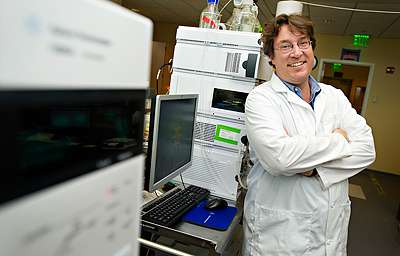Finding biomarkers for early lung cancer diagnosis

Despite decades of warnings about smoking, lung cancer is still the second-most common cancer and the leading cause of death from cancer in the U.S. Patients are often diagnosed only when their disease is already at an advanced stage and hard to treat. Researchers at the West Coast Metabolomics Center at UC Davis are trying to change that, by identifying biomarkers that could be the basis of early tests for lung cancer.
"Early diagnosis is the key to fighting lung cancer," said Oliver Fiehn, director of the metabolomics center and a professor of molecular and cellular biology at UC Davis.
Lung cancer can be diagnosed early with regular low-dose CT (computed tomography) scans of people at risk. But these tests are very expensive, and also involve exposing patients to X-ray radiation. Instead, Fiehn, project scientist William Wikoff and colleagues set out to look for biomarkers of developing lung cancer in blood from patients.
Fiehn's lab specializes in "metabolomics," an approach that involves analyzing all the biochemical products of metabolism in cells and tissues at the same time. Like other "-omics" approaches, it's made possible by new technology and computing power, and it's opening up new ways to understand living processes.
To find early biomarkers for lung cancer, the team needed to look at blood samples collected from people who developed the disease, months or years before they were diagnosed. Fortunately, they were able to access samples stored from the CARET clinical trial. The CARET study, which ran from 1985 until it was halted in 1996, attempted to test whether doses of antioxidant vitamins could prevent cancer in heavy smokers and other people at high risk. The trial failed, but the collection of blood, serum, and tissues and related data are maintained as the CARET Biorepository.
Applying metabolomics, Wikoff and Fiehn found that one molecule, diacetylspermine, was almost doubled in serum collected from patients up to six months before they were diagnosed with lung cancer, compared to healthy controls.
They then combined diacetylspermine with another previously identified biomarker, a protein called pro-surfactant protein B (pro-SFTPB), and tested for both markers in another set of sera collected from CARET patients months before they developed lung cancer.
"Individually, the markers were about 70 percent predictive but in combination, that rose to 80 percent," Fiehn said. In other words, eight out of ten people with early-stage cancer would be correctly identified by the combined test.
If the double biomarker were in use as a clinical test, those patients could then be referred for a low-dose CT scan to confirm the presence of cancer.
The study is published August 17 in the Journal of Clinical Oncology. The next step, Fiehn said, is to work with bigger cohorts of cancer patients to validate the approach.
More information: Journal of Clinical Oncology, jco.ascopubs.org/content/early … 015.61.7779.abstract














